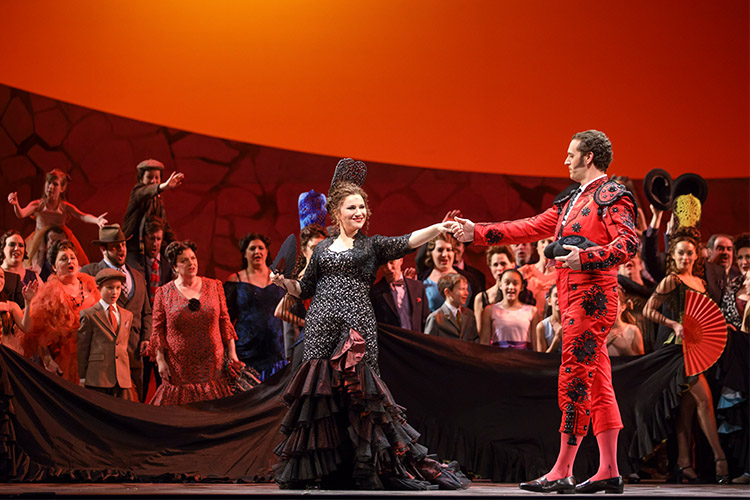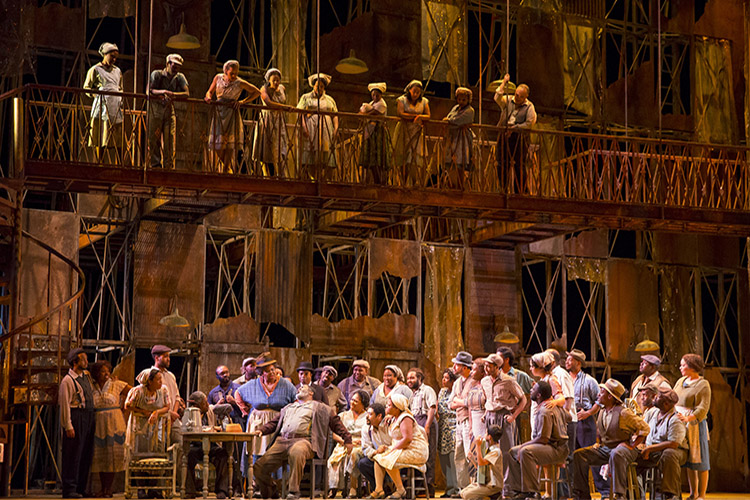May 04, 2020
Opera 101: One-Hit Wonders
There is a small club of composers who have had only one significant operatic hit. No matter how much fame they achieved, or didn't achieve, in other genres, they were only able to produce one great opera that has entered the standard performing repertoire today. Not everyone can be Mozart, Verdi, Wagner, or Puccini—here are just a few examples of some very familiar operatic one-hit wonders from surprising sources.
Dvořák—Rusalka
Most people know Dvořák as a great symphonic composer—his New World Symphony is one of the most recognizable pieces in classical music, and he wrote a wealth of other famous symphonic pieces and notable chamber works. Here is Herbert von Karajan leading the Vienna Philharmonic in the complete New World Symphony:
Herbert von Karajan leading the Vienna Philharmonic in the complete New World Symphony
And though Rusalka contains a very famous aria, the "Song to the Moon" (pictured below, from the Lyric production in 2014), not many people are even aware that Dvořák wrote one opera—let alone ten. As Sir Andrew Davis notes in this video from the 2013/14 Season, Dvořák actually worked quite hard on composing operas and hoped that his operatic contributions would be his legacy. Though it is now firmly in the international repertoire, Rusalka didn't have its Metropolitan Opera premiere until 1993 and Lyric's 2014 production was the Chicago premiere. Our very own Special Project Advisor Renée Fleming is often credited as championing the titular role of this production in the United States.

Ana María Martínez stars in the company premiere of Rusalka at Lyric Opera of Chicago
Bizet—Carmen

Ekaterina Gubanova and Christian Van Horn star as Carmen and Escamillo in Lyric's 2016/17 production
A classic story of passion, jealousy, and betrayal coupled with the eminently hummable tunes that run throughout have turned Carmen into one of the most popular operas of all time. Though Bizet wrote several previous operas, including The Pearl Fishers, none of his other operas has achieved the fame of Carmen. Premiered in Paris in March 1875, the opera was a failure that played to half-empty houses, and Bizet died suddenly near the end of its run without any inkling of the popularity that was just on the horizon. Subsequent revivals in Vienna (1875), London (1878), and New York (1879) cemented its reputation.
Here is just one of the famous songs from the opera, "Votre toast," also known as the Toreador Song, performed at the Metropolitan Opera in 2010:
"Votre toast," also known as the Toreador Song, performed at the Metropolitan Opera in 2010
Beethoven—Fidelio
Beethoven's only completed opera, was a true labor of love that took him nearly ten years to complete. Telling the story of a wife (Leonore) who poses as a boy (Fidelio) to try to rescue her wrongfully imprisoned husband, the opera was first performed in Vienna in 1805 as an utter failure. Beethoven would continue to tinker with the score over the next several years. The overture went through four different versions, and over 300 pages of sketches exist for the entire work. It was at one point condensed to two acts before being restored to three. Finally in 1814, the revised work premiered to great success and has been regularly performed ever since.
Here is the "Mir, ist so wunderbar" quartet from the Theater an der Wien's 2013 production:
The "Mir, ist so wunderbar" quartet from Theater an der Wien's 2013 production
Gershwin—Porgy and Bess

A scene from Lyric's 2014 production of Porgy and Bess
By 1935, when Porgy and Bess premiered, George and Ira Gershwin had cemented their place in the Great American Songbook with countless hits like "I've Got Rhythm" and "Someone to Watch Over Me." George Gershwin had written a short one-act jazz opera in 1922, Blue Monday, that was—you guessed it—a flop! However, that did not kill his desire to write what he called "an American folk opera," so he teamed up with his brother Ira and DuBose Heyward (author of the novel Porgy) to tell the story of the inhabitants of Catfish Row, including the hero Porgy and his true love Bess. Once again, Gershwin appeared to have failed, so he moved to Hollywood to compose for films and died two years later.
In 1952, A touring production of Porgy and Bess, starring William Warfield, Leontyne Price, and Cab Calloway, enjoyed a sold-out 4-week run at the Civic Opera House thanks to a daring ticket-sales strategy engineered by Danny Newman, who two years later helped launch Lyric.
Here's a look at the acclaimed Francesca Zambello production starring Eric Owens from Washington National Opera that was part of Lyric's 2014/15 Season:
Washington National Opera's production of Porgy and Bess
Leoncavallo—Pagliacci

Ana María Martínez and Vladimir Galouzine star in Pagliacci at Lyric in 2009
Containing one of the most famous tenor arias ever written, "Vesti la giubba," Ruggero Leoncavallo's Pagliacci is an enduring masterwork to this day. Premiered in 1892 as the composer's first produced opera, Pagliacci was an instant success with the public (unlike some of our other one-hit wonders). Frequently performed with Mascagni's Cavalleria rusticana, the piece that actually inspired Leoncavallo to write this work, it's a gritty tale of members of an acting troupe caught up in a love triangle that leads to murder. Despite many efforts, Leoncavallo was never able to recapture the magic of his first hit. He even wrote his own La bohème, which was vastly outshone by Puccini's opera from the same source material.
Here is the piece's famous aria, "Vesti la giubba," performed by the great Luciano Pavarotti in one of his signature roles:
"Vesti la giubba," performed by Luciano Pavarotti
Humperdinck—Hansel and Gretel

Elizabeth De Shong, Jill Grove, and Maria Kanyova star in Hansel and Gretel at Lyric in December 2012
A Christmastime favorite since its premiere in December 1893 (conducted by none other than Richard Strauss!), Hansel and Gretel is based on the classic fairy tale by the Brothers Grimm. German composer Englebert Humperdinck wrote the music and his sister Adelheid Wette wrote the libretto—fitting for an opera about a brother and sister. It is just one of several stage works he would compose, but it has far eclipsed anything else he ever did. The famous "evening prayer" scene is one of the most recognizable operatic tunes.
Here are highlights from Lyric's acclaimed production from the 2012/13 Season:
Lyric's acclaimed production of Hansel and Gretel from the 2012/13 Season
And here's the prayer scene from Act Two from the Welsh National Opera's 1998 production:
Act Two of Hansel and Gretel from the Welsh National Opera's 1998 production
Delibes—Lakmé
Set in India, Lakmé was an incredibly popular opera by Leo Delibes, who is also famous for the ballet Copéllia. Premiered in 1883, the opera was for many years known for its soprano showcase, the "Bell Aria" in Act Two. However, in recent years—thanks to its ubiquity in movies and TV commercials—"The Flower Duet" has become this opera's signature showpiece.
Here are Joan Sutherland and Huguette Tourangeau performing the famous duet:
Joan Sutherland and Huguette Tourangeau performing "The Flower Duet"
Photos: Todd Rosenberg, Dan Rest
Except for the official Hansel and Gretel highlights, Lyric Opera of Chicago does not own copyrights to any of the above videos
